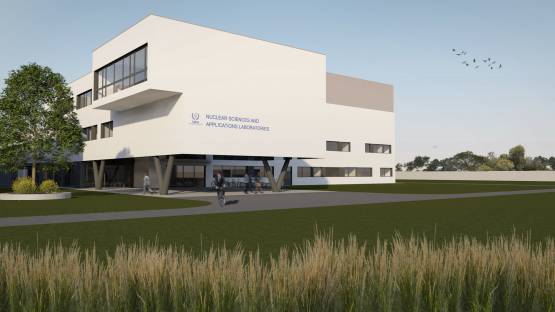Thanks to a joint contribution from eight countries, the IAEA has reached a critical milestone in completing the final phase of the modernization of its nuclear applications laboratories, known as ReNuAL2. In a Board of Governors session on Monday, the United States of America announced on behalf of Australia, Kuwait, Mexico, Nigeria, Qatar, Slovakia and Slovenia a contribution of 6.7 million euros to meet the funding required to begin construction of a new laboratories building in Seibersdorf, near Vienna.
The laboratories play a key role in the Agency’s climate response and help countries address existing and emerging challenges in food and agriculture, human health and environmental management.
“The modernization of the facilities will help the IAEA better support countries,” said Najat Mokhtar, IAEA Deputy Director General and Head of the Department of Nuclear Sciences and Applications. “The work of our experts and the services that they provide at the laboratories cover a broad range of disciplines, from supporting climate resilience and overcoming plant diseases to improving human health around the world.”
This is a first-time contribution to ReNuAL2 for the countries in the group except the United States, which contributed twice previously. “The United States is proud to partner with Australia, Kuwait, Mexico, Nigeria, Qatar, Slovakia and Slovenia to support the critical work of the labs in delivering transformative tools, applications and technologies to the places where they are most needed,” said U.S. Deputy Chief of Mission Louis L. Bono. Australia, Kuwait, Nigeria, Qatar and the United States also provided support for the earlier phase of the ReNuAL initiative.
The Renovation of the Nuclear Applications Laboratories (ReNuAL) initiative has, thus far, delivered new facilities for five of the eight nuclear applications laboratories on the site, including two new laboratory buildings and a medical linear accelerator facility. ReNuAL2, including the construction of the new laboratories building, is the final phase of the ReNuAL initiative. Including this week’s first-time donors, the overall ReNuAL initiative has received extrabudgetary contributions from the governments of 49 countries, as well as from individuals and institutions.
Barbara Zvokelj, Permanent Representative of Slovenia to the United Nations in Vienna, recalled a visit to the Seibersdorf laboratories and described how she experienced first-hand the impact of nuclear technologies to enhance crop biodiversity, contribute to climate-smart agriculture and improve food security. “This is but a small piece of the larger puzzle of how the Seibersdorf laboratories contribute to sustainable development around the world,” she said. “This being one of my country’s most important priorities, it was only natural that Slovenia would contribute its share.”
The new laboratories building will house the Terrestrial Environment, the Plant Breeding and Genetics and the Nuclear Science and Instrumentation laboratories. The three laboratories currently operate in limited space in a building from the 1960s. The new laboratories building will add capacity to meet increased demand for services and is of a “flexible modular” design to be easily adapted to meet evolving needs.
“The wide range of support that these laboratories provide is truly admirable, not only in the context of attaining the Sustainable Development Goals (SDGs), but also in helping to address many current global challenges, such as the fight against climate change, reduction of environmental footprint and improvement in human health,” said Nataly Subrtova, Representative of the Permanent Mission of Slovakia to the UN and International Organizations in Vienna. “This contribution is a practical example of Slovakia's long-lasting commitment to foster further development of peaceful uses of nuclear energy, in line with Article IV of the Treaty on the Non-Proliferation of Nuclear Weapons (NPT)."







